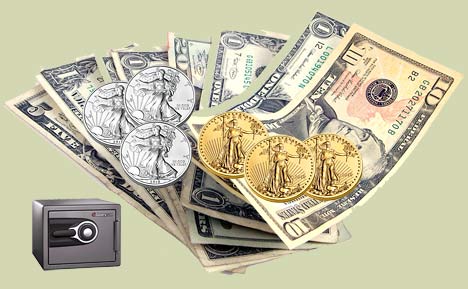Financial Preps

A part of Emergency Preparedness (short term) or Disaster Preparedness (longer term) is financial preparedness. Preparing financially for a short term emergency or preparing for a major long term disaster involve similar but different outlooks and methods. Aspects may include your current indebtedness, the things you own outright, cash on hand, storage of assets, precious metals, and of course… goods for barter.
The following are a few thoughts on the subject…
CASH
Bills
Nothing larger than 20’s. Diversify in singles, 5’s, 10’s and 20’s.
Keep enough in your wallet to get you out of a jam while away from home.
Keep enough at home, in a Safe, to function for several months.
Keep a decoy Safe with enough inside to seem legit, in case of forced robbery.
Coins
Quarters are common for many things including tolls, vending machines.
Foreign Currency
Particularly if you live near a border, having some currency of the neighboring country may prove valuable under some circumstances (e.g. for those in the U.S… the Mexican Peso, the Canadian Dollar)
STORAGE
Safe
Obviously, safe storage of your valuable assets is a priority. Not only is the Safe itself an important consideration, but its safe location is nearly equally important. Out of sight, of course. Secured/bolted to the building structure. Fire-proof for at least one hour. Water-proof. Keep a small decoy safe with a token amount of cash inside in case of forced burglary, so that you can give it up as though it’s all you have. Consider the traditional combination locks rather than electronic locks.
Bug-out bag
Keep some financial preps in your bug-out bag to compliment what you already have in your wallet. This might include extra cash, some precious metals, or other.
Buried Treasure
For less accessible but perhaps more secure safe storage, consider burying it. PVC pipe with glued end-caps will remain moisture free forever. Just don’t let your neighbor see you bury it ;)
Vault
Although not recommended in times of financial collapse, traditional Vaults offer safe keeping. Problem is, you cannot necessarily trust the institution for safe keeping after a major financial collapse… at least I wouldn’t.
PRECIOUS METALS
Silver
Silver is probably the easiest form of wealth conversion since it is more affordable than Gold. Throughout all of human history, silver and gold have not lost relative value to an associated paper currency. In fact, as paper currency depreciates, silver and gold will appreciate in terms of that currency, holding its relative value to hard assets. It is recognized world wide as ‘money’.
Gold
Gold is THE most cross-platform ‘money’ in the world. It’s high price today in terms of most Fiat currencies is a reflection of the devaluation that has been occurring in those currencies. It is an excellent store of excess wealth.
Coins, Rounds, Bars
When choosing a form of precious metal, it is worth your while to consider having it in a form that is recognized by many. For example, the round minted 1 oz American Silver Eagle or American Gold Eagle, and the Canadian Maple Leaf are common and popular precious metal products in North America. For Gold, also consider keeping some 1/10 oz rounds. People are more familiar with these minted coins than they are with various bars. Not saying that you’re any worse off with bars, but they may be more difficult to transact with.
JEWELRY
Jewelry has value to some people, and has throughout all of human history. During the collapse period itself it would not serve you very well, but it is a category that will hold some value through to the other side assuming the collapse is eventually remedied.
GOODS FOR BARTER
This category is core to survival during a collapse period. Any asset or good that will benefit someone else, is of a value. Think about the basics. Think hard assets. Tangibles. Think practical. This category is a catch-all for all those things, and should be considered first, before other forms of financial preps.
